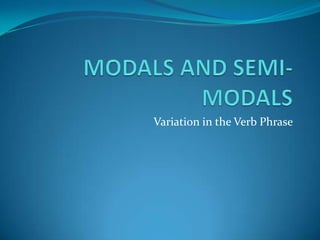
Modal verbs
- 1. Variation in the Verb Phrase
- 2. SUMMARY NINE MODAL VERBS Will – would Shall – should Can – could May – might Must SEMI – MODAL VERBS (had) better, be able to, be allowed to, have to, (have) got to, ought to, be supposed to, be going to, used to, need, needn’t
- 3. CHARACTERISTICS No inflection: “he can study” Act as auxiliaries: “Can you come here?” Always followed by bare infinitive. Never two modal verbs together
- 5. ABILITY CAN “I can swim” COULD “I couldn’t walk until I was 1 year old” BE ABLE TO “I was able to run the marathon”
- 6. POSSIBILITY CAN “He can be your friend” COULD “It could be the most important reason” MAY “You may say I’m a dreamer” MIGHT “You might find it there”
- 7. PERMISSION CAN “Can I go to the toilet? BE ALLOWED TO “I wasn’t allowed to go” MAY “May I stay with you? “You may sit here” (usually produced by parents and teachers talking to children)
- 8. OBLIGATION and NECESSITY MUST “You must be here before eight” / “You must go to the doctor.” HAVE TO “I have to do it right away” SHOULD “You should be here on time” (less imperative)
- 9. PROHIBITION CAN’T “You can’t park here” (It’s against the rules) MUSTN’T “You mustn’t park here” (The obligation comes from the speaker)
- 10. ADVICE and SUGGESTION SHOULD “You should visit him more often”. WOULD “If I were you, I would study engineering” SHALL “We shall go together.” “Shall we do it now?”
- 11. PREDICTION and VOLITION WILL for prediction “You will marry her in two years time.” BE GOING TO for prediction /intention “He is going to laugh about this”. / “I’m going to study harder.” WOULD for volition / intention “I would go with him if he allowed me to” “What would you take to a desert island?”
- 12. PAST HABIT WOULD “When I was a kid, I would come here every day” USED TO “He used to tell me everything”.
- 13. LACK OF NECESSITY NEEDN’T “You needn’t go there” DON’T HAVE TO “You don’t have to go there”
- 14. MODALS COMBINED WITH ASPECT OR VOICE Modals cannot combine with tense, but they can combine with ASPECT or VOICE. With Perfect Aspect (modal + have + participle) With Progressive Aspect (modal + be + ing) With Passive Voice (modal + be + participle)
- 15. PERFECT MODAL VERBS REPROACH: “You should have come earlier.” POSSIBILITY IN THE PAST: “I could have visited you, but I didn’t feel like.” UNCERTAINTY ABOUT THE PAST: “He may have done it, but I don’t know”. DEDUCTION: “He must have arrived. He is always on time”